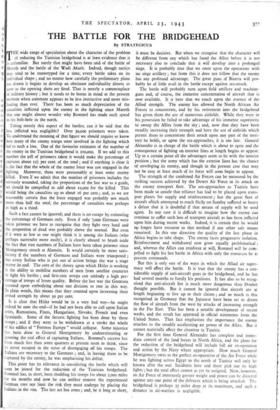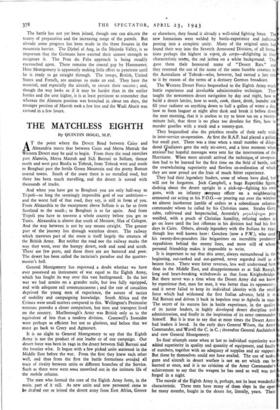THE BATTLE FOR THE BRIDGEHEAD
By STRATEG ICUS HE wide range of speculation about the character of the problem
1r
tg
7.
Taking merely this aspect of the battles, can it be said that the loss inflicted was negligible? Over 30,000 prisoners were taken. To understand the meaning of that figure we should require to know how many of the enemy troops were involved in the fighting which led to such a loss. One of the favourite estimates of the number of the enemy in the Tunisian bridgehead is 210,000. If we add to this number the toll of prisoners taken it would make the percentage of captures about per cent, of the total ; and if anything is clear it i, the fact that the whole of the enemy force was not engaged in the fighting. Moreover, there were presumably at least some enemy killed. Even if we admit that the number of prisoners includes the seriously wounded, taking the proportions of the last war as a guide, we should be compelled to add about to,000 for the killed. This would bring the casualties up to about i6 per cent.; and, as we are reasonably certain that the force engaged was probably not much more than half the total, the percentage of casualties was perhaps as high as a third.
Such a fact cannot be ignored; and there is no escape by estimating the percentage of Germans only. Even if only 7,000 Germans were taken prisoner we have to recognise that they fight very hard and the proportion of dead was probably above the normal. But even if it were as low as one might think it is among the Italians (who perhaps surrender more easily), it is clearly absurd to brush aside the fact that vast numbers of Italians have been taken prisoner since Montgomery struck at Alamein. It would certainly be more satis- factory if the numbers of Germans and Italians were transposed ; but every Italian who is put out of action brings the war a stage nearer its end. The core of the theory upon which Hitler is working is the ability to mobilise numbers of men from satellite countries to fight his battles ; and first-rate troops can embody a high per- centage of troops of lesser quality. Before the last war the Germans counted upon embodying about one division to two in this way. In plain words, this means that they counted upon increasing their armed strength by about 5o per cent.
It is clear that Hitler would be in a very bad way—he might Indeed be near the end—if he had not been able to call upon Italian units, Rumanians, Finns, Hungarians, Slovaks, French and even Spaniards. Some of the fiercest fighting has been done by these troops ; and if they were to be withdrawn at a stroke the whole of his edifice of " Fortress Europe " would collapse. Some injustice has been done to General Montgomery by underestimating or Ignoring the real effect of capturing Italians. Rommel's success has been much less than some quarters at present seem to think, since be never escaped in the sense of disengaging all his troops. The Italians are necessary to the Germans ; and, in leaving them to be captured by the enemy, he was emphasising his defeat.
This point has its relevance in considering the battle which will soon be joined for the reduction of the Tunisian bridgehead. Rommel has, in short, been shedding his troops for about 2,000 miles for six months and now he can neither remove the experienced German core nor limit the risk they must undergo by placing the Italians in the van. The last act has come; and, be it long or short,
in at ,r1 is d ie ie Se h it rs !cl w \• le ;e
it must be decisive. But when we recognise that the character will be different from any which has faced the Allies before it is not necessary also to conclude that it will develop into a prolonged siege. It is probably true that we enter upon the operations with no siege artillery ; but from this it does not follow that the enemy has any profound advantage. The great guns of Bizerta will pro- bably be of little avail in the battle except against sea-attack.
The battle will probably turn upon field artillery and machine- guns and, of course, the immense concentration of aircraft that is now available. It is here that we touch upon the essence of the Allied strength. The enemy has allowed the North African Air Forces to concentrate, and by his retirement into the bridgehead has given them the use of numerous airfields. While they were in his possession he failed to take advantage of his immense superiority to sweep the Allies from the sky ; and, now that they have been steadily increasing their strength and have the use of airfields which permit them to concentrate their attack upon any part of the terri- tory he holds, or upon the sea-approaches, it is too late. General Alexander is in charge of the battle which is about to open and the consequence of fighting on exterior lines at length begins to appear. Up to a certain point all the advantages seem to lie with the interior position ; but the army which has the exterior lines has the chance of enveloping its enemy, and though in the present case that may not be easy at least much of its force will soon begin to appear.
The strength of the combined Air Forces can be measured by the striking success achieved by the Desert Air Force in its attack on the enemy transport fleet. The sea-approaches to Tunisia have been made so unsafe that reliance has had to be placed upon trans- port planes for supply and reinforcement ; but the great fleet of aircraft which attempted to reach Sicily on Sunday suffered so heavy a defeat that it is doubtful if that means of supply will be used again. In any case it is difficult to imagine how the enemy can continue to suffer such loss of transport aircraft as has been inflicted upon him during recent weeks. Indeed, it is certain that he would no longer have recourse to that method if any other safe means remained. In this one direction the quality of the last phase in Africa begins to take shape. The enemy faces progressive isolation. Reinforcement and withdrawal now grow equally problematical ; and, whereas the Allies can reinforce at will, Rommel will be com- pelled to fight his last battle in Africa with only the resources he at present commands.
But this is only one of the ways in which the Allied air supre- macy will affect the battle. It is true that the enemy has a con- siderable supply of anti-aircraft guns in the bridgehead, and he has had several months to fortify his positions. It has also to be recog- nised that anti-aircraft fire is much more dangerous than Douhet thought possible. But it cannot be ignored that aircraft are at length beginning to live up to their claims ; and so much is this recognised in Germany that the Japanese have been set to divert the flow of aircraft from the west by attacks of increasing strength in the Far East. This has been a notable development of recent weeks, and the result has appeared in official statements from the United States. That fact emphasises the importance the enemy attaches to the steadily accelerating air power of the Allies. But it cannot materially affect the situation in Tunisia.
For the first time General Alexander has complete and imme- diate control of the land forces in North Africa, and the plans for the reduction of the bridgehead will include full air co-operation and action by the Navy where appropriate. How much General Montgomery owes to the perfect co-operation of the Air Force while he was fighting across Egypt to the north of Tunisia will only he known after the war. Incidents here and there pick out its high lights ; but the total effect cannot as yet be assigned. Now, however, an Air Force of immensely greater weight and power can he directed against any one point of the defences which is being attacked. Th.: bridgehead is perhaps 35 miles deep at its maximum, and such a distance in air-warfare is negligible. The battle has not yet been joined, though one can discern the scurry of preparation and the increasing range of the patrols. But already some progress has been made in the three fissures in the mountain barrier. The Djebel el Ang, in the Mejerda Valley, is so important that the Germans have exerted their utmost strength to recapture it. The Pont du Fahs approach is being steadily encroached upon. There remains the coastal gap by Hammamet. Here Montgomery is apparently making little effort to penetrate until he is ready to go straight through. The troops, British, United States and French, are anxious to make an end. They have the material, and especially the aircraft, to ensure their success ; and, though the way looks as if it may be harder than in the earlier battles and the cost higher, it is at least pertinent to remember that whereas the Alamein position was breached in about ten days, the stronger position of Mareth took a few less and the Wadi Akarit was crossed in a few hours.



























 Previous page
Previous page